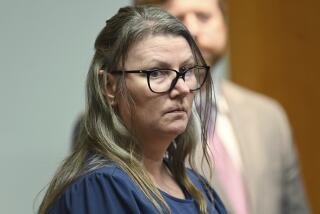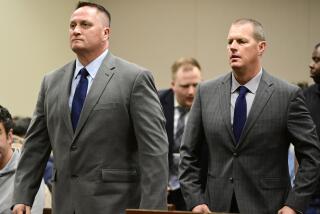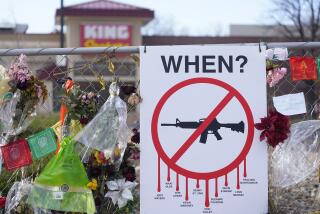What will Dr. Lynne Fenton say about her former patient James Holmes?
Some of the mystery surrounding the Aurora, Colo., theater massacre has been cleared up -- at least as far as the prosecution is concerned -- as the sixth week of trial begins to wind down.
Large swathes of James E. Holmes’ strange brown notebook have been read aloud in open court, and the entire volume has been released to the public. Victims, whose names were blacked out of otherwise open court documents, have testified about their pain and loss.
The jury has heard the 27-year-old acknowledged shooter, who killed 12 people and injured 70, talk about what happened in Theater 9 of the Century 16 multiplex via 22 hours of video recordings played over the last week in Division 201 of the Arapahoe County Justice Center. The entire trial is being live-streamed.
But one voice that has yet to be heard is that of Dr. Lynne Fenton, the psychiatrist who treated Holmes the longest and was the last mental health professional to see him before the July 20, 2012, rampage during a midnight showing of “The Dark Knight Rises.”
Holmes faces 166 charges, including first-degree murder and attempted murder. He has pleaded not guilty by reason of insanity.
Fenton was medical director of the student mental health service at the University of Colorado’s Anschutz Medical Campus in Aurora, where Holmes was a graduate student in the neuroscience program.
Fenton saw Holmes several times over the first half of 2012. Their last appointment was on June 11, 2012, around the time he was dropping out of school.
On July 19, Holmes mailed the psychiatrist his brown, spiral-bound notebook. But she never received the slim volume, with her troubled patient’s plans to “kill as many people as possible” and his strange ramblings.
Fenton is expected to testify during the five-month proceeding, although it is not clear which side she will testify for and whose case she will help most. An exhaustive gag order keeps everyone involved in the trial from speaking outside the courtroom.
But the prosecution has played the video recordings of court-appointed psychiatrist Dr. William Reid prodding Holmes in an effort to assess whether the defendant is sane.
And during those interviews, Holmes talked about his relationship with his former doctor. She was afraid of him, he said, and called campus officials with her concerns about safety. He said he never told Fenton about buying guns and protective clothing and planning a massacre.
Fenton had prescribed Holmes sertraline, a generic version of Zoloft used to treat depression, panic disorder and obsessive-compulsive disorder; and Clonazepam, usually prescribed to treat anxiety and panic attacks.
The drugs may have had an unfortunate side effect, as was evident in the recorded interviews.
Reid: What about the psychiatry with Fenton made the fear go away?
Holmes: I thought the drug sertraline helped reduce anxiety and fear.
Reid: It sounds a little like you’re saying, if you hadn’t had the medication, the shootings never would have taken place.
Holmes: I’d say it was a possibility.
Once Holmes left school, his insurance would not cover his sessions with Fenton, he said. One way he communicated his money problems, he told Reid, was to slide $400 in burned $20 bills into the notebook before he mailed it.
“Money was a factor with me not continuing the therapy,” Holmes said. “If I stayed and got further treatment I might have not done the shooting.”
Follow @marialaganga for national news.
More to Read
Start your day right
Sign up for Essential California for news, features and recommendations from the L.A. Times and beyond in your inbox six days a week.
You may occasionally receive promotional content from the Los Angeles Times.







